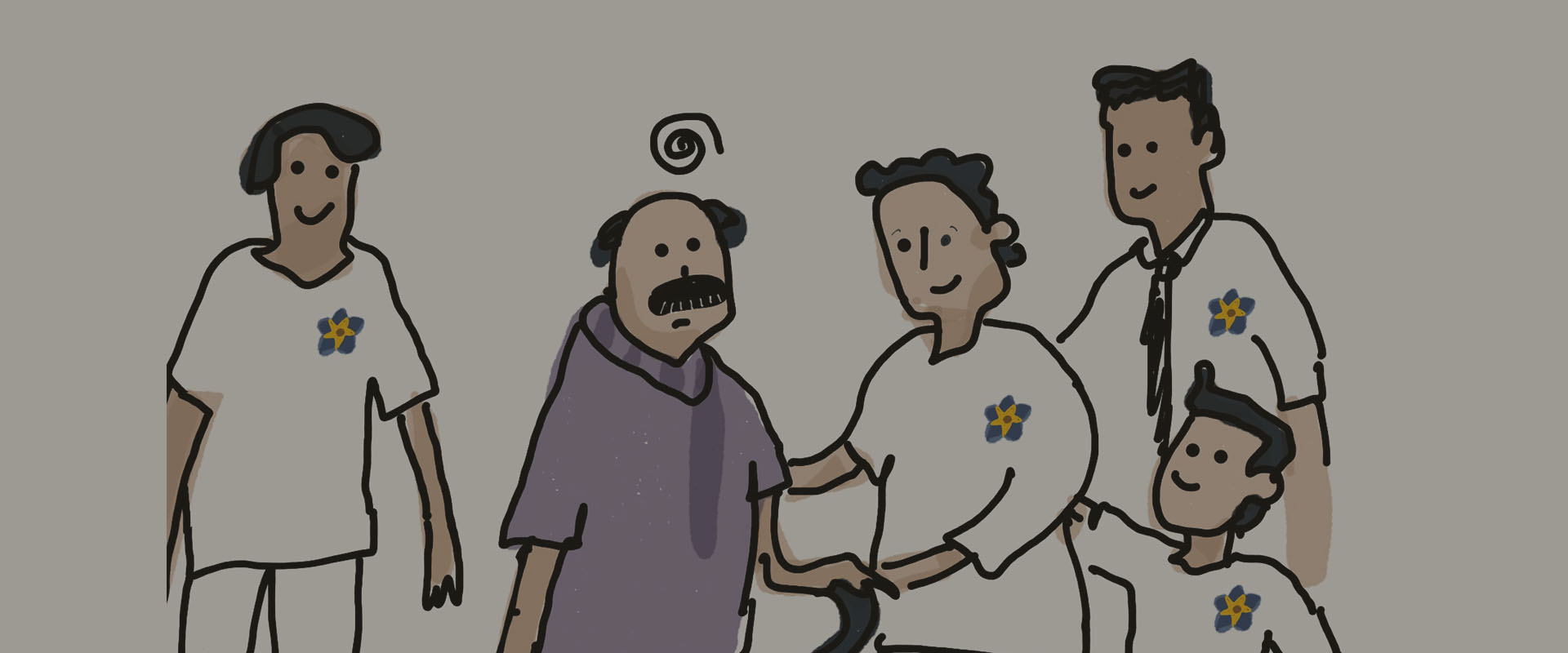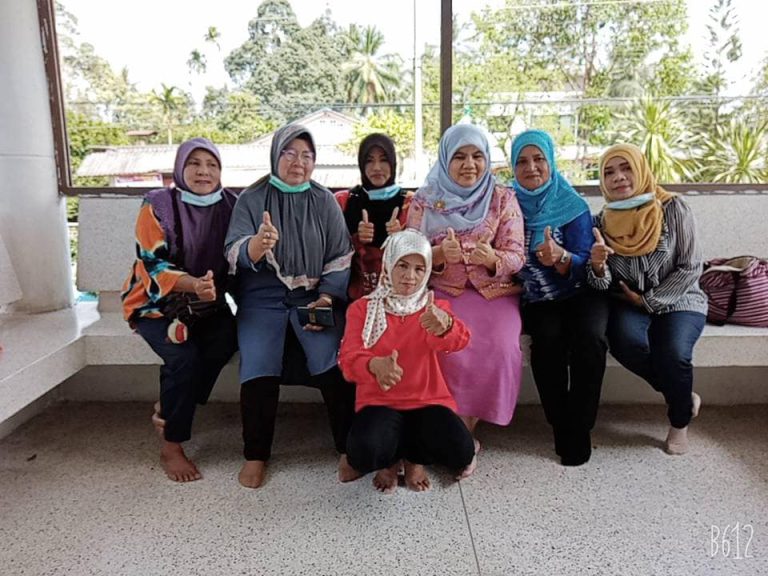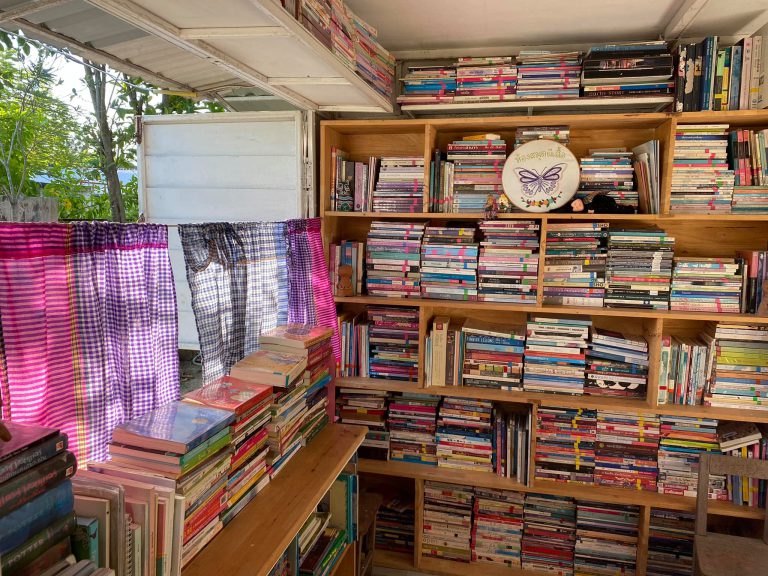Story: Vesarat Toneplin
An elderly man turns to a woman sitting next to him and asks her where she parked her car for the 18th time in the 20 minutes they have been seated, waiting to be called for their doctor’s appointment. That means that he has turned to his daughter with the same question practically once every two minutes. Irritated, she hunches over and loses herself in her phone. When she next raises her head, she finds that her father is no longer sitting beside her.
Around 200 metres from where the girl is sitting, the elderly man wanders around aimlessly. A hospital official watches him out of the corner of their eye before they get up and follow the man from a distance. When the man comes to a stop, hidden in a narrow corner at the stairs, a janitor, upon receiving a signal from the hospital official, walks up to the man and talks to him until she finds out that he needs the bathroom. She then leads the man to the bathroom and waits for him at the front of the entrance, leaving once he has finished. The hospital official and the janitor ask the nurses to identify the man, and once they know who he is, they take him back to his daughter, who was standing with a nurse and waiting for him not far from where he had wandered off.
The hospital official, janitor and the nurses were not the only ones who knew that the elderly man had dementia. The safety officials, front desk workers, convenience store staff and the motorcyclists for hire outside the hospital entrance were all aware and equipped with the skills to look after people with this type of condition. When someone with dementia arrives at the hospital, everyone is notified and collectively prepared to take care of them to their best ability.
At least, this is what I am imagining as I listen to Assistant Professor of Medicine Sirinthorn Chansirikanjon, or Professor Oi, founder of The Alzheimer’s Disease and Related Disorders Association, and an expert on caring for dementia patients with many years of experience, describe a vision of the future that she is working towards.
“You’d never be able to tell whether someone has a moderate degree of cognitive decline, because they seem normal, though their behavior and the way they think have already begun changing”.
Professor Oi’s words are like a gentle tug that brings me back to the conference room where we are currently in conversation. I instinctively sweep my gaze over the people around us after she finishes the sentence.
“Nowadays, people with dementia aren’t called ‘patients’, because we care for them in their status as humans with a condition that is different from us. Just like how people would react a certain way when they see a person who is disabled or HIV positive in the past, but later, we will realize that they are a person with a different condition that can live with us as a part of society”.
To be able to live with one another in society is an important premise that gave rise to the creation of a supportive community for people with dementia, Professor Oi’s latest project. Everyone involved has recognized that placing people with dementia in nursing homes is a sensitive subject, both financially and emotionally. The objective of this community is to find out what they have to do so that people with dementia continue to live happily with their family and as a part of society for as long as possible.
“Together, we are trying to come up with ways for people affected by this condition to receive the level of care that they deserve, so that we have a dementia-aware and dementia-friendly community. That’s just to do with treatment. But what should we be doing to lower the risk of dementia if we don’t want them to have dementia to begin with? We are also working on this. We provide diagnoses and care. The Alzheimer’s Disease Association organizes support for the caregivers that look after people with dementia, which we call “support dementia carers”. How do we make sure that they are receiving help? We also collect information about dementia, and there are many other places, such as Siriraj and Chula, that are studying and developing new treatments alongside us”.
“The WHO is not indifferent. They recognized this problem before we did, and they categorized dementia as a noncommunicable disease (NCD) many years ago. They have been reporting on dementia since 2012, and have a WHO committee on dementia called the World Dementia Council. There is also news of what will be the first meeting between the president of the WHO and the president of the dementia council to put forward all kinds of measures and initiatives.
“Are there a lot of people with dementia? Our country has a population of 60 million. 600,000 of them have dementia.” Professor Oi pauses to smile at me before continuing.
“But even one is more than enough for us.”
Just one person with dementia is more than enough? This means that dementia must have a not inconsiderable impact on society.
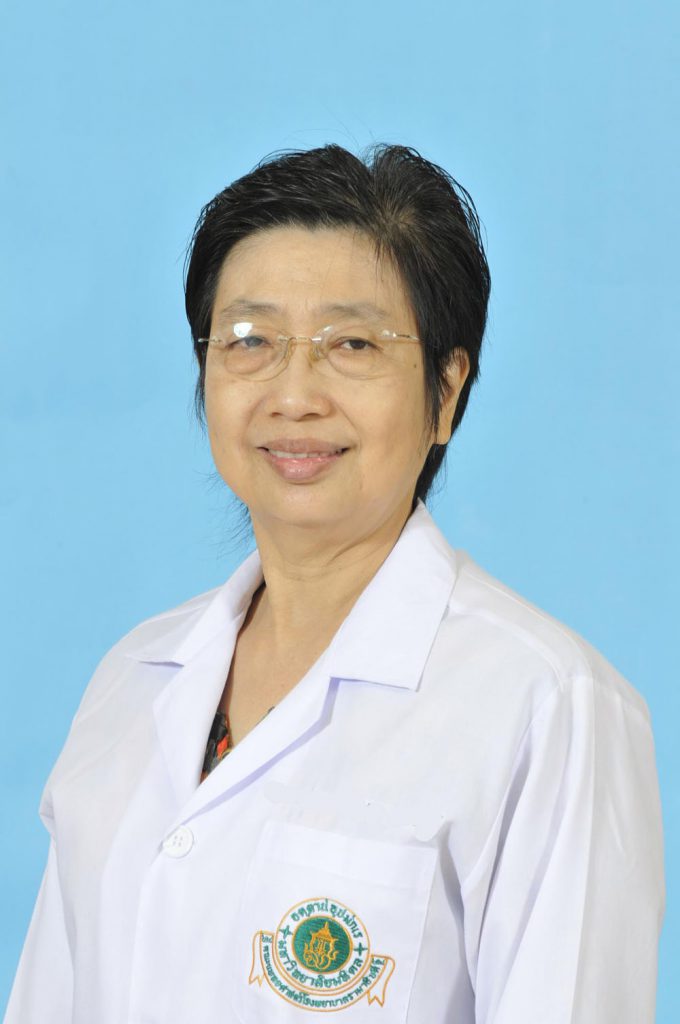
When I first look at ‘Pitiporn Sirithipakorn’s’ face, she appears to be quite happy.
Pitiporn is a nurse who looks after the elderly; her mother has had dementia for more than ten years.
“My mother was diagnosed with dementia when she was 67 years old. Back then, she was still a market vendor. One day, she started giving customers the wrong change. They told her, “Auntie, you’ve given me the wrong change”. My mother would say to them, “What do you mean, I’ve been doing this for many, many years and I’ve never given customers the wrong change”. My mother would then accuse her customers of trying to steal from her.”
I begin to notice the traces of weariness, stress and suffering that surface as she talks. Though they may not be as acute in the present as they were in the past, the small woman before me has definitely been no stranger to them.
“Then my mother began to start cooking something at the market and then forget to turn off the gas. Then it would start to burn. The other vendors were scared of the market catching on fire, so they called me, and asked me to take my mother to a doctor, because it seemed like she had a lot of the symptoms. But after her diagnosis, it took almost three years to get her stop selling things at the market.”
Ultimately, I had to move my mother from Lamphun to Bangkok. She hated it, because I live in an apartment. When she woke up to find that she wasn’t in her house, she would walk out of the place many times a day. I’d get home from a night shift, ask my mother for a minute’s sleep, and wake up to find that she had disappeared. And it’s not easy to find someone in Wang Lang Market. My mother would cross the road to Siriraj Hospital. They’d ask my mom who she had come to see and my mom would tell them that her daughter is a nurse at the hospital. The older nurses who knew me would bring her to the ward at the building where I work. The head of the ward would then call me to tell me that my mother had wandered over there.”
Pitiporn’s situation became increasingly challenging. She tried to bring her mother to work out of concern — but her mother refused to stay in one place, wandering around the entire hospital opening doors to various rooms, walking out to flag a taxi to visit a relative even though she couldn’t remember their address. When she left her mother at home, her mother would try to leave — breaking down the door, climbing the fence, breaking windows — until Pitiporn finally decided to take her mother back to Lamphun, where she originally lived, and place her in the care of an aunt.
“But of course, that wasn’t the end of it, because when my mom woke up, it still wasn’t to her own house. She’d go to the market, since my Aunt’s house is just a kilometre away, but around 20 times a day. Some days she’d go at odd hours too — at 1am or 2am for example. She’d say that she’s going to the market because it’s time to open her store, the customers are already waiting. When I try to tell her that no one’s going to the market yet, she refuses to listen, saying “no, that’s not true”. I have to let her go in the end.”
and when she walks to the market during the day, she always passes by a couple of houses on the way. If she walks by and sees a pair of shoes, she’ll bring them back, but she won’t bring the entire pair back — she’ll be carrying just one shoe. Sometimes its car keys, anything that other people leave lying around because in the provinces, people don’t have to put things away. Watches, glasses, house keys, car keys — if she passes by a temple, she’ll pick up a water bowl — whatever she sees she’d bring back, and we’d have no idea who they belong to. When she comes home, I’d have a basket ready. I tell her that I’d like to bring the things with me to use in Bangkok. Once she’d given them to me I’d put them in the basket. Then the owners would come over and take them back, because I wouldn’t know who or where to return the items to. Just try to imagine the owners coming over in an irritated mood, sort of like ‘your mom’s at it again’
I try to picture what Pitiporn is telling me; it’s not easy to keep trying to understand until you reach the point where you are able to finally accept that someone has dementia, and will say and do things for practically no reason. They constantly function outside reason, outside predictability and different forms of logic, until you are unable to hold on to and communicate with any semblance of reason with them.
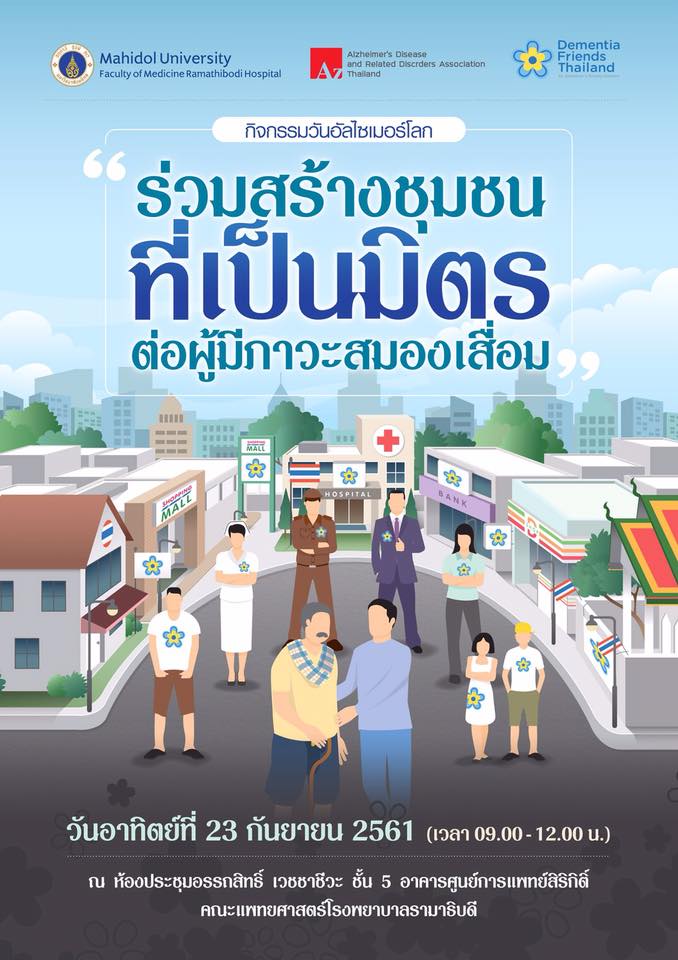
Supportive communities aside, I think that having a supportive family alone is so difficult as to be near impossible. Without common rules, values and logic, how can we, as fragile human beings, live with one another? We can agonize over it until our heads are about to burst but there hardly seems to be a way for people to come together and build a supportive community for people with dementia with Professor Oi.
The ten or so people seated in the circle with me have come from a variety of businesses: the Office of Non-formal and Informal Education, After You (a popular dessert chain), and companies invested in corporate social innovation such as Good Factory, Sathira Dhammasathan Meditation Center, True Corporation and The Mirror Foundation.
The group represented here are the ones that are part of the construction of the supportive community for people with dementia.
If we trace the trajectory of this community, from its origins in the screening and prevention of dementia, we’d have to begin with the Good Factory company, which developed a game called ‘Brain Check’ that evaluates a player’s cognitive faculties. The game was developed in collaboration with neurologists, and tested with many elderly participants before it took shape as a game that could screen the player’s cognitive proficiency for signs of cognitive decline or risk of the onset of dementia (the game can be played at braincheck.net).
Picking up the baton from Good Factory was the Office of Non-formal and Informal Education, which devises field trips and overnight camps that engage elderly participants in cognitive exercises and social activities. The initiative began with the Bangkok Planetarium: groups of elderly visitors that have contacted the Office in advance for a full day tour of the museum are not charged even a single baht.
For people that are beginning to experience cognitive decline, and the family members who have to care for them, there is support from the Sathira Dhammasathan Center, which organises a day camp on meditation practice for emotional well-being that has branched out into activities that teach elderly participants different skills such as garment dyeing, child-care and gardening.
After You, a trendy dessert chain among Thai youth, is in the process of introducing special hours for families with a family member who has dementia, so they have the space, and a window of time, to privately patronise the store. To go out with someone who has dementia on an outing and interact with the rest of society isn’t easy for families, because people with dementia may walk slowly, eat messily or behave in ways that are difficult to understand.
In the event that someone with dementia gets lost, True Corporation has partnered with the Mirror Foundation to develop new wristband technology, called smart wristbands, that both acts as a signal to the public that the wearer has dementia and is connected to apps that send the wearer’s information to the police and the Mirror Foundation. If the wearer appears to be lost, a passer by can scan the wristband from a distance to avoid causing the wearer discomfort.
Once the blueprint of the supportive community has been drawn — from prevention, screening, caregiving measures to tracking lost individuals — the community clearly appears to be composed of people with an awareness and understanding of challenges faced by people with dementia, and have decided to lend a helping hand, to the extent of their individual resources and capabilities, to build and expand the community beyond any limits.
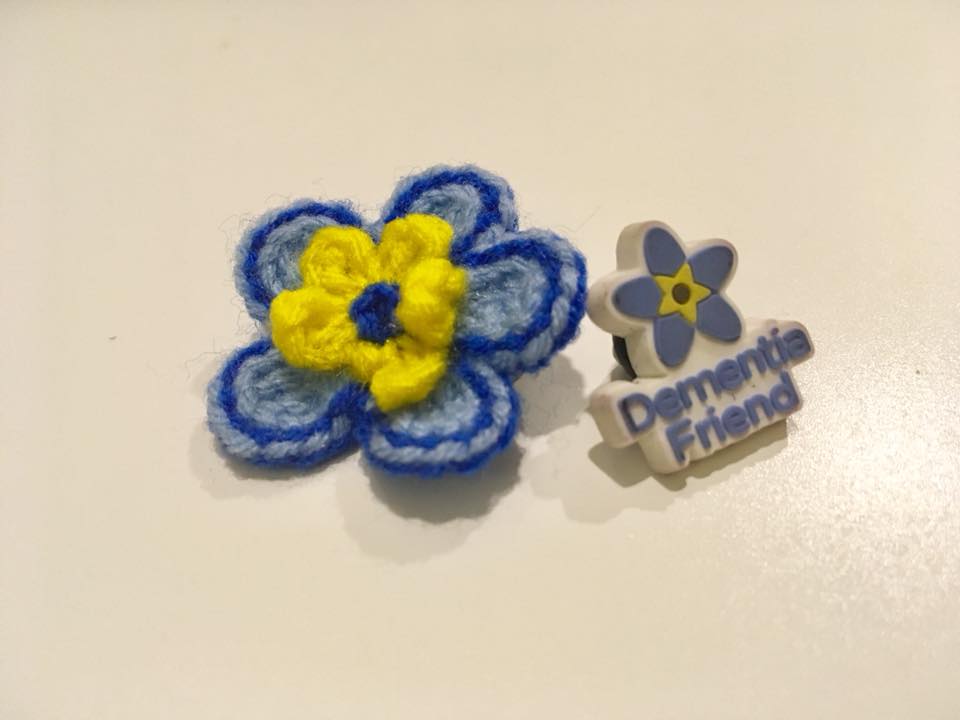
The circle I am currently sitting in looks like a concrete template of the supportive community for people with dementia. Professor Oi gives everyone a friendly smile. Many of the people in the circle have met with Professor Oi many times before, and have come to the meeting as colleagues that have worked with her for a long time. They also became involved out of a sense of responsibility towards people with dementia, inspired by someone close to them with dementia to build this community to help others in the same circumstances as themselves.
Professor Oi shares the story behind the Supportive Hospital for People with Dementia project to the circle:
“We’ve now organised it six times. Doctors, nurses and all the support staff — front desk workers, porters and security guards — around 400 of them have been through our training. Next, we’ll have to train janitors, convenience store staff, and employees of shops around the hospital to recognize when someone seems a little off and likely has dementia. These people will have an awareness of dementia. We call them ‘dementia friends’”.
‘Dementia friends’ receive a flower symbol that they can pin to their chest. Professor Oi emphasizes that on the days that they feel ready to look after people with dementia, they can pin the flower to their chest and perform their regular duties while expressing that they can give their full support.
“But on days like ‘wow, I was run ragged last night’, please take off the flower. ‘I can’t be a dementia friend today, I can’t do it , I’m on my last legs’ — if you’re likely to be the devil rather than a nurse today, then take the flower off. But on any day that you are wearing the flower, you have on a sign that says that you are ready to take care of someone with dementia”.
In my opinion, knowledge may not be as key as love for dementia friends. Different theories and concepts aren’t that difficult to learn. The greater challenge is putting them into practice through genuinely caring for people with dementia from the heart.
Or sometimes, a supportive community for people with dementia is a community with a shared awareness of the love and kindness that is intrinsic to all of us, whether we strengthen it through practice or not.
Professor Oi recalls a restaurant in Japan that hired people with dementia to serve food and take orders from customers.
“Its a restaurant where you won’t get to eat what you ordered. Customers are told that they will be served by staff with dementia. When a customer arrives, a staff member runs up to them, and then forgets what they came to do when they get to the table. The customer will remind them that they’re there to take an order. Once they’ve ordered, they prepare themselves for what will arrive, as the food that comes to the table may not be what they wanted. But the customers say that it’s just as tasty when they get something else; they can have that too. It really gives the staff a sense of self-worth”.
That’s right, if we always keep in mind that people with dementia are also another fragile human being that doesn’t need to be validated at the level of the reason, but is in search of love that comes from the heart , which doesn’t have to be processed through the mind or logic in any way.
“When we understand, we expect less. We’ll do less harm to each other and truly, be much happier”.
Or, warp and weft of this community is in the heart.
It is another part of our humanity that we give such little importance to nourishing.
Important people mentioned: Assistant Professor of Medicine Sirinthorn Chansirikanjon.
Photo credits: https://med.mahidol.ac.th/med/th/division/geriatic/staff
